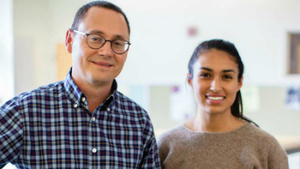Rising to the challenge

Leaving behind an early life of poverty, Layla Cervantes (College Eight ’16, molecular, cell and developmental biology) is defying the statistics and becoming “a great scientist,” in the words of her proud mentor.
When Cervantes was growing up, there were times she and her family found themselves sleeping on friend’s couches and in family members’ homes. She remembers the years when her father, Jose Cervantes would have to cross and re-cross the Mexican border just to find work to sustain the family. Once they settled in the United States, her mother, Raquel Mendoza, had to work hard to provide for her children.
Despite these challenges, Cervantes got a confidence boost after her first year at UC Santa Cruz, when she got a prestigious summer internship at the Genome Technology Center at Stanford University with the help of two caring mentors.
Her two summers at Stanford eventually lead her to the research she is doing today at UC Santa Cruz’s Microbiology and Environmental Toxicology Department.
“It’s been a long road, but I’m happy to be here,” said Layla Cervantes.
This year, she was given a prestigious Undergraduate Research Award for her work. The award—made possible by a generous private contribution—gave her the chance to prove herself. It included a cash prize that enabled Cervantes to attend the Emerging Researchers Conference in in Washington, D.C.
The conference went well. She was able to share her work with scientists all the over the country. One of them even invited her to apply to his department for graduate school.
This encounter and the overall great reviews from her judges helped build her self esteem. In the opinion of her mentor, Associate Professor In Microbiology and Environmental Toxicology Manel Camps, Cervantes has “great hands.” He uses this informal expression to talk about her reliability, resolve, talent, and strong work ethic in his lab.
“The lab seems to be her natural habitat,” Camps said.